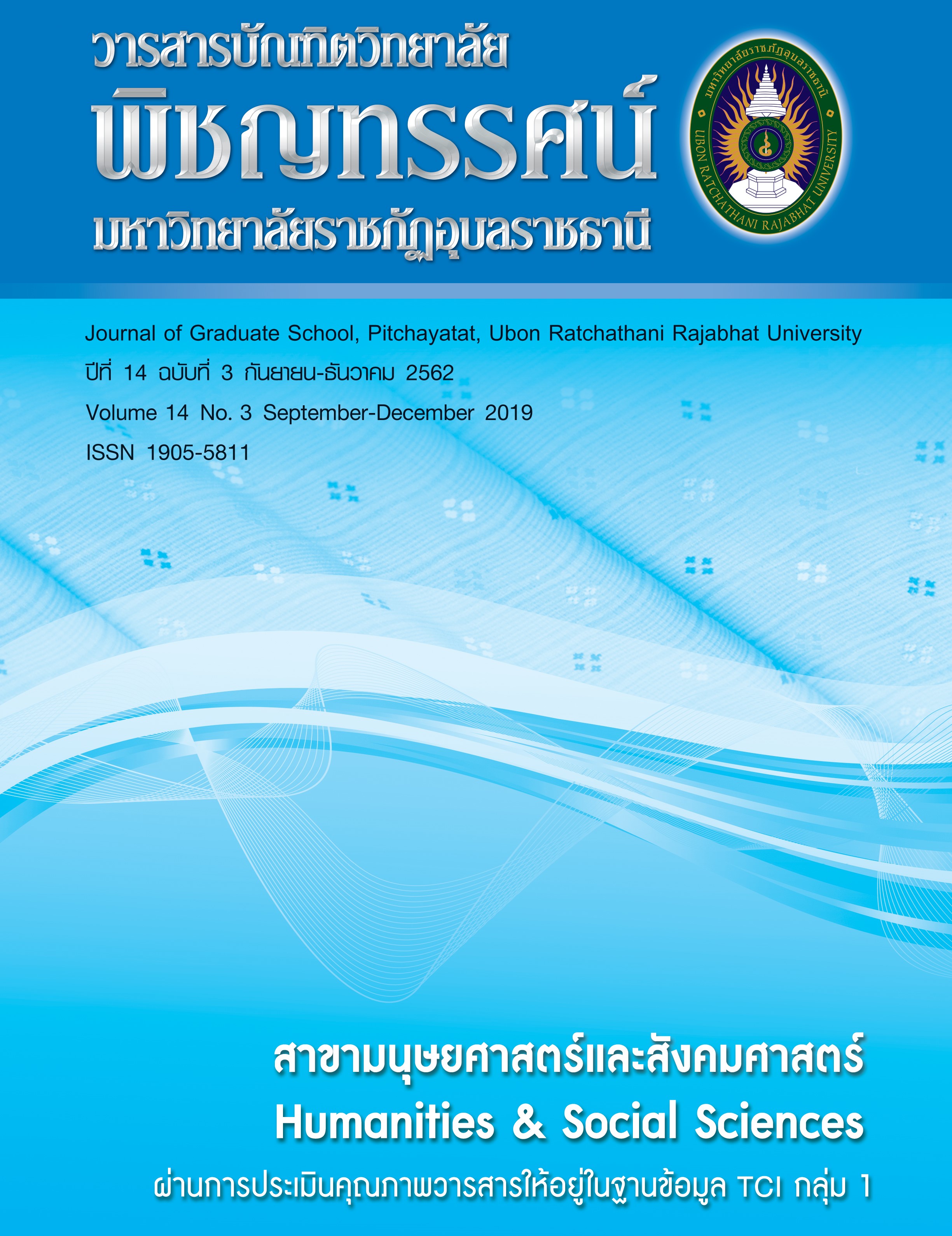การเปรียบเทียบผลการเรียนประเด็นปัญหาทางสังคมที่เกี่ยวข้องกับการใช้วิทยาศาสตร์ โดยใช้การเรียนแบบผสมผสานตามวิธีสมองเป็นฐานกับการเรียนแบบปกติ ที่มีผลต่อความสามารถในการโต้แย้งและการคิดวิเคราะห์ของนักเรียน ชั้นมัธยมศึกษาปีที่ 2 ที่มีการนำตนเองในการเรียนรู้ต่างกัน
คำสำคัญ:
ประเด็นทางสังคมที่เกี่ยวข้องกับการใช้วิทยาศาสตร์, การเรียนแบบผสมผสานตามวิธีสมองเป็นฐาน, การนำตนเองในการเรียนรู้บทคัดย่อ
การวิจัยครั้งนี้มีความมุ่งหมายเพื่อเปรียบเทียบผลการเรียนประเด็นปัญหาทางสังคมที่เกี่ยวข้องกับการใช้วิทยาศาสตร์โดยใช้การเรียนแบบผสมผสานตามวิธีสมองเป็นฐานกับการเรียนแบบปกติ ที่มีผลต่อความสามารถในการโต้แย้งและการคิดวิเคราะห์ของนักเรียนชั้นมัธยมศึกษาปีที่ 2 ที่มีการนำตนเองในการเรียนรู้ต่างกัน จำนวน 60 คน จาก 2ห้องเรียน ซึ่งได้มาโดยการสุ่มแบบกลุ่ม แบ่งเป็น 2 กลุ่ม ได้แก่ กลุ่มทดลองที่ 1 จำนวน 30 คน เรียนแบบผสมผสานตามวิธีสมองเป็นฐานและกลุ่มทดลองที่ 2 จำนวน 30 คน เรียนแบบปกติ เครื่องมือที่ใช้ในการเก็บรวบรวมข้อมูลได้แก่ 1) แผนการจัดการเรียนรู้ 2) แบบทดสอบวัดความสามารถในการโต้แย้ง 3) แบบวัดการคิดวิเคราะห์ และ 4) แบบสอบถามการนำตนเองในการเรียนรู้ซึ่งมีค่าอำนาจจำแนกอยู่ระหว่าง .32-.85 และค่าความเชื่อมั่นของแบบสอบถามทั้งฉบับ .87 สถิติที่ใช้ในการวิเคราะห์ข้อมูล ได้แก่ การทดสอบทีแบบกลุ่มสัมพันธ์ และ การทดสอบเอฟ
ผลการวิจัยพบว่า นักเรียนโดยส่วนรวม นักเรียนที่มีการนำตนเองในการเรียนรู้สูงและนักเรียนที่มีการนำตนเอง
ในการเรียนรู้ต่ำ หลังเรียนประเด็นปัญหาทางสังคมที่เกี่ยวข้องกับการใช้วิทยาศาสตร์โดยใช้การเรียนแบบผสมผสานตามวิธี
สมองเป็นฐานมีการพัฒนาความสามารถในการโต้แย้งเพิ่มขึ้นจากการสอบ ครั้งที่ 1-4 และนักเรียนโดยส่วนรวมมีการคิดวิเคราะห์โดยรวมและรายด้านเพิ่มขึ้นจากก่อนเรียน (p.001) นักเรียนที่เรียนโดยใช้การเรียนแบบผสมผสานตามวิธีสมอง
เป็นฐานมีความสามารถในการโต้แย้งและการคิดวิเคราะห์โดยรวมและรายด้านทั้ง 3 ด้าน มากกว่านักเรียนที่เรียนโดยใช้
การเรียนแบบปกติ (p.003)
เอกสารอ้างอิง
ธนวัฒน์ คำเบ้าเมือง. การเปรียบเทียบผลสัมฤทธิ์ทางการเรียนความสามารถในการคิดวิเคราะห์แรงจูงใจใฝ่สัมฤทธิ์ต่อการเรียนวิชาคณิตศาสตร์เรื่องรูปสี่เหลี่ยมชั้นประถมศึกษาปีที่ 6 ระหว่างการจัดกิจกรรมการเรียนรู้โดยใช้ปัญหาเป็นฐาน (PBL) กับการจัดกิจกรรมการเรียนรู้แบบปกติ. วิทยานิพนธ์การศึกษามหาบัณฑิต มหาวิทยาลัยมหาสารคาม, 2551.
นิตยา ทิพศรีราช, ปัทมาวดี ปาสาจะ, และภูวดล โกมณเทียร. “การเปรียบเทียบความสามารถในการโต้แย้งและการคิดวิเคราะห์จากการเรียนประเด็นปัญหาทางสังคมที่เกี่ยวข้องกับการใช้วิทยาศาสตร์โดยใช้การเรียนแบบผสมผสานตามวิธีปัญหาเป็นฐาน และวัฏจักรการเรียนรู้ 5 ขั้น ของนักเรียนชั้นมัธยมศึกษาปีที่ 5 ที่มีความเข้าใจธรรมชาติวิทยาศาสตร์ต่างกัน”, วารสารช่อพะยอม มหาวิทยาลัยราชภัฏมหาสารคาม. 26, 2 (มกราคม 2558): 109-123.
ไพฑูรย์ สุขศรีงาม. ปรัชญาการศึกษากับการพัฒนาหลักสูตรวิทยาศาสตรศึกษา.วารสารวิจัยและพัฒนาการเรียนการสอน. 2, 1 (มกราคม-มิถุนายน.2530):1.
ไพฑูรย์ สุขศรีงาม. การเรียนรู้ตามกลุ่มสร้างสรรค์ความรู้ (Constructivism) เอกสารประกอบการสอนวิทยาศาสตร์ศึกษา. มหาสารคาม: มหาวิทยาลัยมหาสารคาม, 2550.
ไพฑูรย์ สุขศรีงาม. เอกสารแนะนำโปรแกรม SPSS : เอกสารประกอบรายวิชา1601501 Statistic methods for sciences and health sciences. มหาสารคาม: มหาวิทยาลัยมหาสารคาม, 2553.
วิชรุต อัคติ. การเปรียบเทียบผลการเรียนประเด็นปัญหาทางสังคมที่เกี่ยวข้องกับวิทยาศาสตร์โดยใช้การเรียนแบบผสมผสานตามวิธีปัญหาเป็นฐานกับวัฏจักรการเรียนรู้ 7 ขั้น ที่มีผลต่อความสามารถในการโต้แย้ง และการคิดวิเคราะห์ของนักเรียนชั้นมัธยมศึกษาปีที่ 3 ที่มีแรงจูงใจใฝ่สัมฤทธิ์ต่างกัน. วิทยานิพนธ์การศึกษามหาบัณฑิต
มหาวิทยาลัยมหาสารคาม, 2558.
ส่งเสริมการสอนวิทยาศาสตร์และเทคโนโลยี, สถาบัน. คู่มือการจัดการเรียนรู้ กลุ่มสาระการเรียนรู้วิทยาศาสตร์. กรุงเทพฯ: กรมวิชาการ, 2544.
สมนึก ภัททิยธานี. การวัดผลการศึกษา. พิมพ์ครั้งที่ 4. กาฬสินธุ์: ประสานการพิมพ์, 2544.
สุนันทา บุญโนนแต้ และจีระพรรณ สุขศรีงาม. “การเปรียบเทียบผลการเรียนประเด็นปัญหาทางสังคมที่เกี่ยวข้องกับการใช้วิทยาศาสตร์ โดยใช้รูปแบบการเรียนรู้แบบผสมผสานตามวิธีปัญหาเป็นฐาน และวิธีวัฏจักรการเรียนรู้ 7 ขั้น ที่มีต่อความสามารถในการโต้แย้ง และการคิดวิเคราะห์ ของนักเรียนชั้นมัธยมศึกษาปีที่ 4”, วารสารรมยสาร มหาวิทยาราชภัฏบุรีรัมย์. 14, 2 (2559): 139-150.
อนงค์นาถ พรมพินิจ, ชาติไทย แก้วทอง, และน้อยเนียมสา. การเปรียบเทียบผลการเรียนประเด็นปัญหาทางสังคมที่เกี่ยวข้องกับการใช้วิทยาศาสตร์ โดยใช้รูปแบบการเรียนแบบผสมผสานตามวิธีปัญหาเป็นฐานกับรูปแบบการเรียนแบบผสมผสานตามวิธีวัฏจักรการเรียนรู้ 7 ขั้น ที่มีต่อความสามารถในการโต้แย้งและการคิดวิเคราะห์ของนักเรียนชั้นมัธยมศึกษาปีที่ 6 ที่มีผลการเรียนฟิสิกส์ต่างกัน. วารสารช่อพะยอม มหาวิทยาลัยราชภัฏมหาสารคาม. 27, 2 (2559): 127-138.
Finley, F.N. “Science Process”, Journal of Research in Science Teaching. 20,1 (January 1983): 47-54.
Gibson, H.L. adn Chase, A. Longitudinal Impact of an Inquiry-based Science Program on Middle School
Students Attitudes Toward Science, Science Education. 86, (2002): 693-705.
Hewson, P.W. and Hewson, M.G. An appropriate Conception of Teaching Science: A View From Studies of Science Learning. Science Education. 72, 5 (1988): 597-614.
Jimenez-Alexandre, M.P. and others. Doing the Lesson or "Doing Science": Argument in High School Genetics.
Science Education. 84,6 (2003): 757-792.
Lewis, S.E. Issue-Based Teaching in Science Education. (Online) 2003 (Cited January 15, 2014). Available
From: ttp://www.actionbioscience.org/education/Lewis.html. Lin, Shu-Sheng and Mintzes, J.J. Learning
Argumentation Skills through Instruction in Socioscientific Issues : The Effect of Ability Level. International Journal of Science and Mathematics Education. 8, 6 (December 2010): 993-1017,
Osborne, J. and Wittrock, M.C. Enhancing the Quality of Argumentation in School Science. Journal of Research in Science Teaching. 41, 10 (2004): 944-1020.
Pedretti, E. Decision making and STS education: exploring scientific knowledge and social responsibility in schools and science center through an issues- based approach. School Science and Mathematics. 99, 4 (1999): 174-181.
Reis, P. Teaching Controversial Socioscientific Issue in Biology and Geology Classes: A Case Student. Electronic Journal of Science Education. 13, 01 (2009): 1–24.
Sadler, T.D. Socioscientific Issue Research and Its Relevance for Science Education. Paper Presented to Science Education Graduate Student at the of Research. Journal of Research in Science Education. 41, (2002): 513–536.
Simon, S., Erduran, S. and Osborne, J. Learning to Teach Argumentation : Research and Development in the Science Classroom. International Journal of Science Education. 28, 2-3 (2006): 235-260.
Wheatley, G.H. Constructivist Perspective on Science and Mathermatics. Science Education. 75, 1 (1991): 9–21.
ดาวน์โหลด
เผยแพร่แล้ว
รูปแบบการอ้างอิง
ฉบับ
ประเภทบทความ
สัญญาอนุญาต
บทความทุกเรื่องได้รับการตรวจความถูกต้องทางวิชาการโดยผู้ทรงคุณวุฒิภายนอกอย่างน้อย 3 คน ความคิดเห็นในวารสารพิชญทรรศน์เป็นความคิดเห็นของผู้นิพนธ์มิใช่ความคิดเห็นของผู้จัดทำ จึงมิใช่ความรับผิดชอบของวารสารพิชญทรรศน์ และบทความในวารสารพิชญทรรศน์สงวนสิทธิ์ตามกฎหมายไทย การจะนำไปเผยแพร่ต้องได้รับอนุญาตเป็นลายลักษณ์อักษรจากกองบรรณาธิการ





